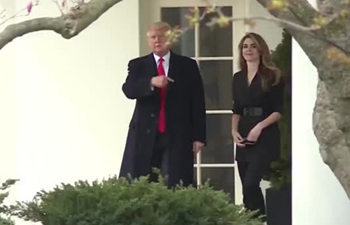By Julia Pierrepont III
LOS ANGELES, April 1 (Xinhua) -- Adding to Hollywood's #MeToo and #TimesUp woes, President Donald Trump threw gasoline on the fire when he announced trade tariffs against China last month that may have serious unintended consequences on Hollywood's bottom line.
Hollywood financing executive, Todd Shoemack, expressed his concerns.
"Trump puts zero thought or research into his decrees. Without consulting his own trade experts, he fires off these policy changes without considering the consequences, as if they're no more important than his infamous midnight tweets," he told Xinhua Friday.
But he was one of the only Hollywood insiders willing to speak on the record, since Hollywood is too nervous to talk to the press, which is really saying something. Few other studio executives wanted to stick their necks out for fear of reprisals.
When asked for a reaction to Trump's tariffs by Xinhua, both NBC Universal and MGM responded with a resounding, "No comment," while other studios ducked the question all together.
Not surprisingly, Fox had no concerns about Trump' s radical approach.
"What has happened there (at Fox) in the last two years is somewhat shocking frankly," said CNN head, Jeff Zucker, to the Financial Times. "It really is state-run TV. It is a pure propaganda machine and I think it does an incredible disservice to this country.
Commerce Secretary Wilbur Ross told CNBC, "We're an administration that believes in objectives. We never would have gotten where we are now without tariffs."
But, as markets tumbled, Bloomberg expressed their concerns over escalation, "President Donald Trump's push to rebalance global trade in America's favor has investors on edge, as his threats to impose import tariffs and curb foreign investment raise the specter of retaliation that could spark a global trade war."
"The backlash on Hollywood could be severe," Shoemack worried, "From both China and Trump. We're negotiating new quotas with China even as we speak - that's all up in the air now. And Trump is infamous for using his power to get even with his detractors and he hates Hollywood. Strangely, that might actually work in Hollywood's favor with the Chinese."
As financial markets react adversely to Trump's announcements and China's reaction, Hollywood has much to lose if a trade war scuttles the progress they've made in recent trade negotiations with China.
Many industry pundits estimate that China will overtake the U.S. as the largest film market by 2020.
Since last February, U.S. trade representatives have been in prolonged talks with their Chinese counterparts to hammer out a deal to expand the current quota of foreign films, primarily Hollywood blockbusters, that are allowed to screen in China. This new scuffle between the two trade giants may put those key talks in jeopardy.
Currently, 34 foreign films are allowed into Chinese theaters on a revenue-sharing basis of which foreign producers receive 25 percent of the total producer profits, after exhibition and distribution splits.
Another three dozen or so foreign pics are allowed in on a straight territorial licensing fee basis, which are typically released via video-on-demand or online streaming channels.
Prior to the latest saber-rattling by the White House, China had been signaling a willingness to ease up on the quotas, potentially increase foreigner's box office split, and do away with black-out periods during which only Chinese movies can be screened.
Since demand for movies is so high in China, particularly in 3rd and 4th tier cities where other forms of entertainment can be scarce, these moves had been seen as a potential win-win which would fill China' s the growing number of exhibition slots and enhance revenues for their theater chains as well.
Hopes had also been high that more Chinese companies might be allowed to distribute foreign films in China, opening up the industry to market forces, and that Hollywood studios might be granted a say in the release dates of their pictures.
But recent developments have left analysts and Hollywood execs increasingly pessimistic.
Derek Scissors, resident scholar at the American Enterprise Institute expressed his concern to Variety. "Film quotas are exactly the kind of target the Chinese would threaten in response to these tariffs," he revealed.
"The tariffs will not especially harm China, but they will want to deter further action. While attention focuses on soybeans and the like, China prefers smaller but high-profile targets," he warned.
One could hardly find a more high profile target than the motion picture industry, which receives the lion's share of attention from fans and social media all over the world.
Escalating trade tensions with China can only hurt Hollywood's bottom line, due to it's increasing dependence on a territory whose box office has grown from a modest 1.47 billion U.S. dollars in 2010 to a whopping 8.6 billion U.S. dollars in just seven years, an exponential growth of nearly 600 percent.
But the outlook is not all doom and gloom.
High profile Hollywood attorney, Lindsay Conner, Co-Chair of the Entertainment and Media practice of Manatt, Phelps & Philips and advisor to the Universal-Perfect World 50-pic state deal, also sounded a more optimistic note in a recent interview with Variety, when he postulated that China's measured response to Trump' s trade tariffs might bode well for Hollywood.
"There will inevitably be ups and downs in the broad relationship of the two nations," he advised, "But the mutual stake that Hollywood and China have in the entertainment industry will continue for a long time to come."













